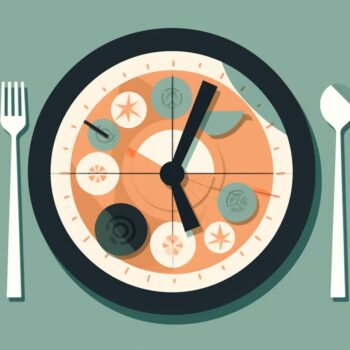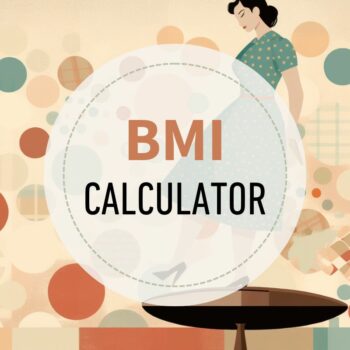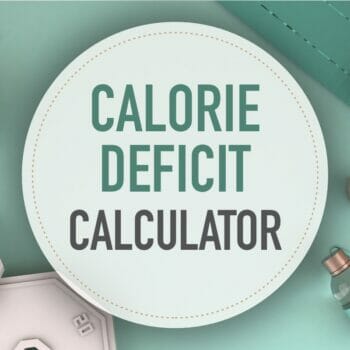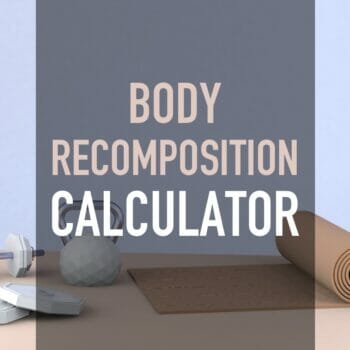TDEE Calculator
Use this TDEE calculator to quickly find your Total Daily Energy Expenditure (daily calorie needs).
Why is TDEE important?
Your TDEE (Total Daily Energy Expenditure) tells you exactly how much you must eat daily to maintain weight.
- Eat more than this, and you will gain weight.
- Eat less, and you will lose weight
This is called a calorie deficit – calculate it here.
Is TDEE and BMR the same?
No, they are not.
Every day your body burns a specific number of calories just by existing. This is known as your Basal Metabolic Rate or BMR.
BMR is based on weight, height, and age but does not include daily activity or exercise.
TDEE is effectively your BMR + extra exercise or activity.
TDEE and BMR are not the same, and as most people do more than lie in bed each day, TDEE is a more helpful tool.
Should I eat my TDEE to lose weight?
No. Your TDEE shows you your daily maintenance calories. If you eat your TDEE, you will stay the same weight.
How do you calculate TDEE for weight loss?
You lose weight by having a calorie deficit.
A calorie deficit means eating less than your body needs to maintain itself.
Ever had more bills than you had money? You had a financial deficit.
A calorie deficit is consuming less energy than you need to stay the same weight.
TDEE Weight Loss Example
Let’s say your BMR is 1,700 calories per day. With some physical activity, you end up with a TDEE of 2,300 calories.
To lose weight, you should consume around 1,840 calories per day.
How much should I subtract from TDEE?
After working with hundreds of successful clients, we’ve found a deficit of 20% from your TDEE is optimum.
You can also achieve a deficit by burning more calories through exercise.
Every effective diet, whether high fat, low fat, high carb, or low carb, uses a calorie deficit to achieve weight loss.
Why shouldn’t I subtract more calories?
Technically you could eat nothing all day and achieve weight loss through having a calorie deficit.
Many well-publicized crash diets put you into a severe caloric deficit. They result in short-term weight loss but will damage your metabolism.
Reducing your calories by more than 20% may lead to muscle loss. This is not desirable as muscle helps burn additional calories.
How long does it take to see results from a deficit?
There are 3,500 calories in a pound of fat, so with a 20% calorie deficit, most people will lose about a pound a week.
Your body can become conditioned to repeated exercise affecting your calorie intake and TDEE.
Not sure of the best path to achieving your health and fitness goals?
So switch things up from time to time! Change exercise routines, intensity, and duration.

How to get results with TDEE and a calorie deficit
Macro counting is a great way to hit your daily calorie target. You lose weight healthily and sustainably.
Counting macros (and flexible dieting) is non-restrictive. It means you still eat your favorite foods – provided they fit within your TDEE and macro goals.
You could eat unhealthy foods and still achieve weight loss. – as demonstrated by the 27-pound weight loss of Dr. Mark Haub.
However, loading your diet with fresh veggies, fruits, nuts, seeds, and lean meats is best. This way, you can feel awesome AND achieve weight loss.
TDEE FAQs
Does it matter what I eat if I count calories?
Yes and no.
You could eat nothing but snack cakes or pizza and still lose weight – if you maintain a calorie deficit.
However, for healthy body composition, a balanced diet is recommended.
Tracking macros will ensure you get enough of each macronutrient and meet micronutrient needs.
Does TDEE include exercise?
Yes, the TDEE is your total daily energy expenditure, so it must include all your movement in 24 hours.
Even non-exercisers are still doing activities around the house – eating, showering, running errands, etc.
Don’t confuse TDEE with Resting Energy Expenditure (REE) or Basal Metabolic Rate (BMR). These two represent energy expenditure if you lay in bed all day and did nothing.
How do I measure my TDEE and calorie intake?
Use the calculator above. It uses the most common variables.
If you want a genuinely accurate TDEE – talk to a coach.
Totaling your calories for the day is usually done with a macro tracking app.
How often should I recalculate my TDEE?
It would be best if you recalculated your TDEE as you lost weight. Do this every 6-8 weeks.
Does this have anything to do with BMI?
Body Mass Index or BMI is a measure of height and weight. It’s not the same thing as TDEE.
How do I use TDEE to gain muscle?
Once you’ve calculated your TDEE in the calculator above, add 10% to the calorie amount. The new calorie amount gives you a good starting point for weight gain.
If you still aren’t gaining, move this to a 20% surplus (use the macro calculator).
View article sourcesSources
- Rising, R., Harper, I. T., Fontvielle, A. M., Ferraro, R. T., Spraul, M., & Ravussin, E. (1994). Determinants of total daily energy expenditure: variability in physical activity. The American journal of clinical nutrition, 59(4), 800-804. study link
- Schulz, L. O., & Schoeller, D. A. (1994). A compilation of total daily energy expenditures and body weights in healthy adults. The American journal of clinical nutrition, 60(5), 676-681. study link
470 Comments


 Menopause Macro Calculator
Menopause Macro Calculator Intermittent Fasting Calculator
Intermittent Fasting Calculator BMI Calculator
BMI Calculator Calorie Deficit Calculator
Calorie Deficit Calculator Body Recomposition Calculator
Body Recomposition Calculator
Im 77.5 kg and i have a TDEE of 2369 im 14 years old now, if i just ate 1200 calories a day , can i lose nearly 1 kg per week??
That’s too much of a calorie deficit at your age. Deduct no more than 20%.
Calculating energy expenditure is never an exact science and there are many factors that we can’t take into account. But, you’re right that all weight loss does rely on an energy deficit in some manner or another. Having a rough idea about energy expenditure can certainly help guide the process – and may offer people an indication about where they’re going wrong.
Hi there.
I am a 19yo male, and my TDEE is 2820. I used to eat the total of 1850calories a day (some days 2000cal). With that I’ve been lost 16lb in 16 weeks, but now I’m not sure if that amount is fair for my body to keep cutting 1lb body fat, without loosing lean mass. I actually weight 180lb and my body fat is 18%, but whiling to lower it to 10%. What can I do to adjust my calorie intake in order to loose 1lb a week?
I have another random question…. Is it true that in order to loose weight or to keep a healthy body, the 70% has to be from a good nutrition, 25% from weightlifting and/or exercise, and 5% psychological/social environment? I just heard that from a fitness athlete. I hope you can help me with that.
Thanks!!
Hi Daniel, It does seem like your calorie deficit is a bit too steep. You really should be in a 20% deficit since you are still at 18% body fat but not more than that or your muscle mass will suffer. Our macro calculator here will calculate everything for you. What your friend told you is good advice. People often forget the emotional component. Too much stress can really put a damper on your results.
I exercise 5-6 days per week – cardio, HITT, Pure Barre. For a long time, I did not really pay attention to my weight since my range was always the same. About a year ago, I went to the doctor and was completely surprised to find out that my weight was 122 pounds! I’d never weighted so much in my life and seeing that number made me panic! I know you’re not supposed to pay attention to the scale – I hear this all the time – but I just cannot get over the frustration of seeing such “high number” for me. The funny thing is that I have not noticed a huge difference in the way my clothes fit so I’ve always wondered if the extra weight was actually muscle – not fat.
I’ve struggled with this for the past year pretty much. I have plateaued and I don’t know how to break this. I’m a very healthy person – my food choices are always very good. It’s sad to say, but I’m just traumatized with the number on the scale. I really wish I could go back to a range I feel comfortable with (114-116).
I eat 1100-1200 per day – some days less, and after reading all the comments, it sounds like I may have been eating less than what I should and that may have caused the weight increase? Any advise will be appreciated. Thanks!
Hi Lori, You should follow the steps mentioned in the article above to calculate your TDEE and then eat accordingly.
Hello, I’m just starting my weighloss journey and I just learned that my BMR is 1718 to maintain. In order for me to lose weight do I deduct 500? I have been trying to stay under a 1200 calorie intake and on top of that I just started crossfit, I do that about 3 times a week and try to do cardio at home. So far I lost 10 pounds but I’m struggling a lot with my diet, I can go a week eating so good and I will have a bad day of overeating (mainly on the weekends) and my weight fluctuates which is so discouraging. I’ve lost weight before but this time around feels impossible I don’t know why, but I’m not giving up. I feel that my calorie intake is off because I do workout, so do I add the calories I lose or not? I’m confused
Hi Alejandra, Great job on losing 10 pounds! However, you need to be eating more, especially if you’re doing CrossFit and yes, exercise gets added back in if you have already calculated your deficit. Our calculator here does everything for you. Choose moderately active for days you do CF and sedentary for days you don’t exercise.
Thank you for the reply! I will definitely use the calculator and adjust to that.
Hi Ted! When I calculate my daily calories, it shows that for maintenance I need 1746. When I try to eat that little I don’t feel very good. Is that something I’ll get used to, or are my calculations wrong?
Hi Bre, I’m not sure because I don’t know your stats, exercise level or goal. If you’ve been overeating then you’ve created a set point for your body. Diverging from this does take some time to adjust. But, 1746 is much better than the 1200 calories many diets would recommend for a woman.
My TDEE is 1191. I definitely wouldn’t want to cut out 500 calories. Maybe I’ll try the 20% reduction.
That doesn’t sound right and seems pretty low even for a maintenance sedentary TDEE. What are your stats?
Hello Ted, my maintenance is about 2000. I have been eating, roughly, 3000 each day for a good while. I powerlift, yet have a fairly sedentary job. I recently reduced my daily caloric intake to avoid unnecessary fat gain. I’m carrying, approx., 60 lbs of adipose tissue. I weight 210 with a supposed LBM around 150lbs. If I maintain a daily intake of 2275 with macros that correlate with lean muscle gain, continue my daily routine regarding energy expenditure, my body will slowly utilize my excess fat stores for fuel until my metabolic rate decrease tapers off, correct?
Hi Mike, Yes that is usually how it works. Since you have a fair amount of fat to lose, I would start with a deficit of 20%. You probably won’t gain much muscle but you should lose what you have and the fat will burn off faster.
Ted, thank you for your response. When you refer to the deficit, are you referring to my TDEE (2000) or from the 3000kcal that I’ve been eating daily?
Your 20% deficit is derived from subtracting it from your maintenance TDEE.
Hello there. I’m having a hard time controlling my diet, primarily due to the availability of healthy foods and tight budget (as a college student). I’m always tempted to eat whenever I get easy access to food. There’s literally fast food everywhere in our place, and it’s easily making me forget diet. And then at night time, I can’t help but feel bad about myself.
Anyhow, my TDEE is 2346. During weekdays, I always consume less than that. Although my diet is mostly composed of protein and sodium so maybe there’s something wrong with it. During weekends, I’m not so sure about the calorie count, but I tend to eat fast food for breakfast and lunch so I guess I’m over that limit.
On the body composition side, I’m very unhealthy. I’m overweight, my body fat percentage is around 30% and I don’t exercise regularly. (although I think that may be compensated for the fact that I study in a mountainous region, so that may be replaced by walking on steep areas).
On top of that, I tend to sleep around 12AM or even 2AM because I can only concentrate when it’s quiet at night. Our school library won’t work for me because my friends would often disturb my studying mood.
You really should start tracking your macros using a smartphone app. Being aware of how much you are eating vs. how much you need is a huge step in solving the problem. Start by learning more about the process here: https://healthyeater.com/flexible-dieting
Hello,
I have a question I believe you might be able to answer. I used the calorie calculator and determined that my maintenance calories are 2273, Fat loss 1819, and extreme fat loss is 1364 calories (I’m 5’3, 22 yrs old, 145 lbs). For almost a year I’ve been eating 1200-1400 calories and doing different exercises. I’ve managed to drop from 181 to 145 but have been plateauing for about a month now. I want to lose about 10 more lbs. I am currently eating 1200 calories and for the past 3 weeks have been running on the treadmill to burn between 500-600cals on my fitness tracker. But the scale won’t budge and this article showed me it’s because I’m under eating. Should I go up to 1800 calories and still continue to burn between 500-600 calories through running 4/5 days a week? Do I need to eat more? If I increase calories from 1200 to 1800 but continue to run, will I still gain weight?
Thanks!
Hi Clara, Yes, you’ve been undereating, which after time caused your weight loss to stall because your metabolism slowed down in order to preserve resources. You really need to work on getting your metabolism to where it should be for a 22-year-old. This involves eating more. I would advise that you gradually increase your calories, but don’t expect things to change overnight and you could possibly gain a pound or two during the process. Sometimes it can take 3 weeks to get things going again. You really only want to eat at extreme weight loss calories for no more than 6 weeks or what your dealing with usually happens.
Hi Ted,
Thank you for getting back to me so quickly. Since I’m eating about 1200 cals and then burning about 500-600 cals, my net is about 600-700 cals which I can see is very low. I know you’ve suggested to gradually increase my calories, how should I go about doing this? Should I introduce about 100-150cals extra a week until I’m at 1800? Or do I need to increase even more because my net is so low so the increase in calories would level out? (basically, should I just eat 1800 for the next week because after subtracting exercises I’d be at about 1200 cals net?)
Thank you!
-Clara
Probably go up 200 each day and then increase after a week. Also be aware that most fitness trackers over-estimate calorie burn so the 500-600 may be a little high. They don’t account for things like exercise conditioning which is your body’s adaptation to exercise. Check out our calculator here, https://healthyeater.com/flexible-dieting-calculator and set it for moderate activity “lose” setting. This will already factor exercise calories in and show you exactly what you should aim for eventually.
I was just curious.. I am trying those fat and my calories deficit was calculated at 1819.. which is 20% below maintenance. However, my diet has been very bad and I have been as high as between 3000 and 3500 calories a day. Would you just drop straight down to 1819 or would you gradual go down said to maintenance for like a week and then to 1819? Is there any downside to going straight to 1819? I’m male, 44 yrs, 5’10 tall, weigh 225, BF is about 30%. Thanks
Hi Ravi, The only downside from making such a drop is that you’ll most likely feel pretty hungry until your body adjusts. It may be easier to do a gradual approach, but it’s not necessary if you feel can deal with the hunger aspect.
Hello ? I sent ia lot of msgs been 2 days but nobody answered me… Pls can you help understand this my Bmr is 1000 calories a day to maintain my weight so I’m supposed to eat 700 to lose weight … Suppose I eat 1400 calories which is more but burn in my exercise 1200 calories did I reach my goel … Meaning can I cut the extra consumed and also extra to lose weight… Cause I can’t eat less I get very dizzy… I prefer to creat my dificitcy thorough exercise and eat a liitle more …
Hi Shreen, This is the first comment you left on our website. I think you’re confused. Please see our calculator: https://healthyeater.com/flexible-dieting-calculator